Palestinian Prime Minister Mohammad Shtayyeh demanded that Israeli Caretaker Prime Minister Yair Lapid to hand over Villa Hanna Salameh, a Palestinian house in Jerusalem whose owners were expelled during the 1948 Palestinian Nakba.
Lapid was planning to live in the villa.
At a weekly cabinet meeting held in Ramallah on Monday, Shtayyeh said that Lapid should return the house to its owners.
Shtayyeh also called for not violating the property of refugees who were forcibly displaced from their homes.
Citing UN Resolution No. 194, Shtayyeh said that those who were removed from their homes have the right to return.
Lapid is preparing to move into Villa Hanna Salameh, which is located nearby government headquarters in Jerusalem.
According to Israeli media, the residence is owned by Hanna Salameh, a Palestinian businessman who had represented General Motors in Palestine and Jordan
The villa of exceptional architectural quality was built in 1932 on Balfour Street.
To this day, the residence still contains hallmarks belonging to its original owners.
For example, there is an iron grille inscribed with the words “Villa Salameh” and a large placard in three languages explaining the building's history and design.
Yedioth Ahronoth reported that Lapid was planning to move to the Prime Minister's Office on Balfour Street in Jerusalem, but considering the renovation work in the place currently, he “decided to live temporarily in the nearby Villa Hanna Salameh.”
The house was seized by the Israeli government under the Absentees' Property Law, which grants the state the power to confiscate and impound Palestinian properties and assets that they were forced to leave behind in 1948.
Two previous Israeli prime ministers, David Ben-Gurion and Levi Eshkol, refused to live in Palestinian properties seized under the absentees' law, making Lapid's decision an anomaly in Israeli politics.
For his part, Shtayyeh voiced the Palestinian Government’s rejection of the settlements carried out by Israeli authorities in Jerusalem.









